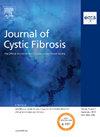Impact of UPLIFT, a group telehealth intervention, on symptoms of depression and anxiety in adults with CF
IF 5.4
2区 医学
Q1 RESPIRATORY SYSTEM
引用次数: 0
Abstract
Background
Despite high rates of anxiety and depression, research regarding the effect of psychological interventions on people with CF (pwCF) is limited. We evaluated the impact of UPLIFT (Using Practice and Learning to Increase Favorable Thoughts), a group telehealth intervention using mindfulness-based cognitive behavioral therapy (MBCT), on symptoms of anxiety and depression in pwCF.
Methods
This multicenter randomized trial compared changes in symptoms of anxiety and/or depression in adult pwCF who participated in the 8-week UPLIFT intervention to a treatment-as-usual (TAU) group. Follow up assessments occurred immediately after and 6- and 12-months post-intervention. Primary outcome measures were change in Patient Health Questionnaire (PHQ-9) and Generalized Anxiety Disorder (GAD-7) scores modeled in separate linear mixed-effects models.
Results
Sixty-six pwCF participated. At baseline, 43 (65.15%) had some minimal symptoms of depression (PHQ-9≥5) and 44 (66.67%) had some minimal symptoms of anxiety (GAD-7≥5). During the 12 month follow up period, the overall change in PHQ-9 was greater in the UPLIFT group compared to TAU (p = .049). Analysis of individual time points showed a statistically significant difference between groups in change from baseline immediately post-treatment (-2.321, SD 0.684 vs 0.362, SD 0.656, p = .005); differences persisted but were not statistically significant at 6 and 12 months. Similar trends for changes in GAD-7 were non-significant.
Conclusions
Participation in UPLIFT, a group telehealth intervention using MBCT, provides short-term improvement in symptoms of depression, as measured by changes in PHQ9. Improvement in symptoms of anxiety were suggested but could not be statistically confirmed.
集体远程医疗干预——UPLIFT对CF成人抑郁和焦虑症状的影响
背景:尽管焦虑和抑郁的发生率很高,但关于心理干预对CF患者(pwCF)影响的研究有限。我们评估了UPLIFT(使用练习和学习来增加积极思想)的影响,这是一种使用基于正念的认知行为疗法(MBCT)的群体远程医疗干预,对pwCF患者焦虑和抑郁症状的影响。方法:这项多中心随机试验比较了参加8周UPLIFT干预和常规治疗(TAU)组的成年pwCF患者焦虑和/或抑郁症状的变化。干预后立即、6个月和12个月进行随访评估。主要结局测量指标是患者健康问卷(PHQ-9)和广泛性焦虑障碍(GAD-7)评分的变化,这些评分采用单独的线性混合效应模型建模。结果:66名pwCF参与者。基线时,43例(65.15%)有轻微抑郁症状(PHQ-9≥5),44例(66.67%)有轻微焦虑症状(GAD-7≥5)。在12个月的随访期间,与TAU组相比,UPLIFT组PHQ-9的总体变化更大(p = 0.049)。个体时间点分析显示,治疗后立即与基线相比,组间变化具有统计学意义(-2.321,SD 0.684 vs 0.362, SD 0.656, p = 0.005);差异持续存在,但在6个月和12个月时无统计学意义。GAD-7的类似变化趋势无显著性。结论:通过PHQ9的变化来衡量,参与UPLIFT(一种使用MBCT的群体远程医疗干预)可在短期内改善抑郁症状。焦虑症状得到改善,但无法得到统计证实。
本文章由计算机程序翻译,如有差异,请以英文原文为准。
求助全文
约1分钟内获得全文
求助全文
来源期刊

Journal of Cystic Fibrosis
医学-呼吸系统
CiteScore
10.10
自引率
13.50%
发文量
1361
审稿时长
50 days
期刊介绍:
The Journal of Cystic Fibrosis is the official journal of the European Cystic Fibrosis Society. The journal is devoted to promoting the research and treatment of cystic fibrosis. To this end the journal publishes original scientific articles, editorials, case reports, short communications and other information relevant to cystic fibrosis. The journal also publishes news and articles concerning the activities and policies of the ECFS as well as those of other societies related the ECFS.
 求助内容:
求助内容: 应助结果提醒方式:
应助结果提醒方式:


